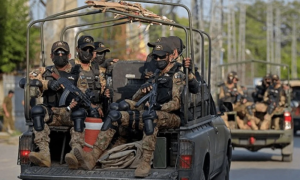By Naveed Khan
Ahmed, an 8-year-old, was ready to participate in Iqbal’s day activities, organized by his school on 9th November. The next day, he woke up with burning eyes and throat infection which made him stay at home.
It was a heart-breaking experience for him. Same is the story of hundreds of millions of people who reside in Lahore and its surrounding areas. A new criminal is in the town which goes by the name of air pollution.
Looking at facts and figures, research shows that living in Lahore can decrease one’s life by an average of 5 years, which is a gross injustice for the citizens of the country who struggle, on a daily basis, to earn enough to eat twice a day.
If they stay at home, without going out, they suffer hunger and starvation, but, on the other hand, if they go out, which they must, air pollution especially smog is ready to induce slow death in them.
According to the Air Quality Index (AQI) by the World Health Organization, an AQI of 50 is considered to be of good quality. In this regard, Lahore has done what Pakistan cannot do even in test cricket, it has crossed AQI of 2000 and its average AQI hovers around 800 to 1000.
As Multan has brotherly relations with Lahore and it cannot leave behind its brother, as a result, it touched an AQI of 2135. Leave Lahore alone, Pakistan is among one of the topmost polluted countries in the world according to data from the World Bank.
Smog is well aware with the mentality of Pakistani cities, they do not imitate accomplishments of one another, but they are ready to accept ailments. As a result, smog has spread into many other cities of Pakistan, leading to complete pause of social, political and economic activities and people are compelled to inhale particulate organic matter (PM 2.5).
This, in return, becomes part of the bloodstream, leading to various respiratory diseases and even cancer in severe cases. Despite this lethality, it is very alarming, even disappointing, that common people have no idea of the dangers the current air pollution poses.
The developed world has dealt with smog by passing and implementing laws in the mid-20th century. What about the country where politicians pass laws to make sure they stay in power?
Who is responsible for all this? Smog occurs because of temperature inversions where warm air is trapped below cool air.
Geographical factors, like mountains, valleys and maidans, also lead to smog. It is also caused by irresponsible burning of agricultural products, especially rice which contributes 20% to the formation of smog. It is followed by industries, adding 25% to smog and the most ignored but major source is transportation sector which massively contributes 45% to air pollution.
Unfortunately, not only in Pakistan but the whole region has no specific laws governing vehicular emissions.
READ ALSO: New Delhi Smashes WHO Smog Limit
It is a farce that Pakistan and India do not share much, in terms of trade and investment, but they contribute to each other’s pollution generously. Crop burning on either side of the border leads to air pollution on the other side hence instead of cross border trade, we have transnational pollution.
Smog in India is quite understandable, looking at its industrial and economic growth, but Pakistan is not that much industrialized; it still has to experience industrial growth. The people of Pakistan, citizens of Lahore at that occasion, suffer because of the crimes they never committed.
Although, some of that pain is still self-induced; Lahore has lost 70% tree cover in the last 20 years according to Amin Aslam. Who did that? Obviously, it was done by indigenous people making room for more and more housing societies at the peril of environment; for everyone, it is a pyrrhic victory.
What can we, as a state and society, do in order to save our coming generations from the wrath of air pollution? Pass laws and do meaningful legislation regarding vehicular emissions; public transport should be encouraged. Leaving regional animosities aside, India and Pakistan can cooperate with each other in the matter of cross-border pollution; it should not be treated as a tool of hybrid warfare.
People in Pakistan do not know about the dangers of air pollution which is why they are taking it lightly; it is the need of hour to educate people about the eminent threats of this menace. Artificial rain is also one of the solutions, but it comes at a huge cost which is not a permanent solution for Pakistan.
It is high time the state started working on clean energy development and opt for sustainable urbanization. Air pollution should be treated as a violent criminal as it is killing the citizens of Pakistan whose lives are constitutionally protected by the state. To deal with a violent criminal, we act pro-actively and work together as a nation on an emergency basis.


























